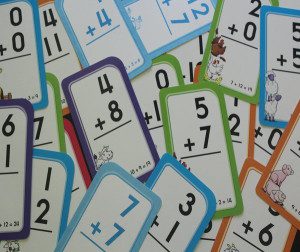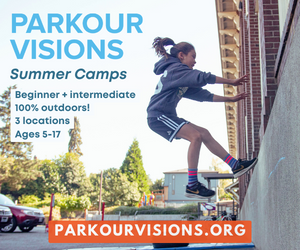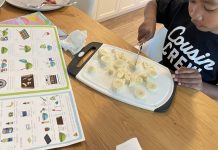While Common Core math has helped my eight-year-old in school, it has exceeded my 40-year-old addition skills.
I was in the car with the kids one day, attempting to add double-digit numbers. I vocalized the problem out loud, simultaneously picturing it in my mind’s eye, and vainly attempted to carry figures. My second grader overheard me, and to my surprise, correctly announced the answer.
“How did you do that?” I asked her. In response, she offered something offhandedly about “making a ten.”
 Growing up, numbers didn’t interest me as much as words, yet memorization proved easy. I remember sitting around the dinner table with my family, rattling off math facts. In school, I hung in there through pre-calculus, until concepts like “f of x” became too abstract to hold my attention.
Growing up, numbers didn’t interest me as much as words, yet memorization proved easy. I remember sitting around the dinner table with my family, rattling off math facts. In school, I hung in there through pre-calculus, until concepts like “f of x” became too abstract to hold my attention.
My husband, on the other hand, comfortably sits in abstraction. He recognizes and appreciates the inherent beauty and practicality in all mathematics. He studied engineering in college, and excels at thinking through problems of many kinds.
So I let him assist with math homework when Common Core throws me for a loop (the learning methods vary greatly from the rote memorization I mastered as a child). My husband’s response as he glances over the worksheets? “Huh. This is actually how I naturally think about math.” I want to snatch the homework back from him, because I’m competitive like that. If our kids learn to think about math like their dad, so must I! Good thing I like to learn. Yet learning new ways to think about anything proves much harder at 40 than at eight. Difficult, but not impossible.
Common Core has adapted and modeled our country’s math curriculum after other nations around the world, places where kids test better in subjects like math. Our kids now learn several different ways to solve a simple math problem. While two plus two will always equal four, it turns out the human brain contains many ways to picture and understand the concept.
On a grander scale, it’s teaching me more than ever to hang back from solving my kids’ problems. Not just math, but any life conundrum. I invite them to think through several ways to look at a quandary. And I’m trying this on my own predicaments, too. What else do other cultures do better, and how can we incorporate it into our learning? What other opportunities do kids and parents have to learn or think differently, even beyond math?
And so I’m learning second grade arithmetic all over again. How to make a ten and easily add double-digit addends, etc. Because it turns out that truly knowing something involves the ability to understand it from several different angles. Perhaps this will help me truly appreciate math as much as I cherish language. And maybe it’s why my daughter wants to be a math teacher when she grows up.


















